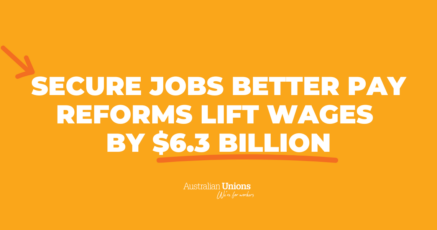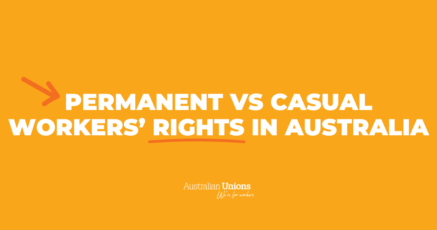Now’s the time to check you know your rights as a casual
In Australia, there are more than two million workers employed casually. As the payslips come in for the recent public holidays, there’s no better time to brush up on your rights as a casual worker in Australia.
The inconvenient truth about penalty rates
Penalty rates are extra payments you get on top of your regular wage. In Australia, they were introduced way back in the 1940s after a union campaign on behalf of workers.
You could think of penalty rates like an additional fee your employer has to pay you for working odd and unsociable hours.
Your employer wants you to work at inconvenient times when you could be hanging out with friends and family, relaxing on the weekend or just enjoying your downtime and getting a good night’s sleep? That’s fine, but they have to pay you more.
When taking shifts that trigger penalty rates, always be vigilant and understand what’s in it for you.
For the past nine years, Coalition Governments have sat by as big business have attacked penalty rates.
The penalty rates you’re entitled to depend on the award or agreement covering your workplace. They’re usually calculated as a percentage of your regular wage, so when you hear ‘time and a half,’ that just means you’re being paid an extra 50% of your normal wage.
To see the exact penalty rates that apply to you, check the Award or agreement that covers your work or call the Australian Unions Support Centre on 1300 486 466.
If you’re not getting overtime, you’re being underpaid
Never forget that you can’t be expected to work overtime for free.
When it comes to understanding overtime, the clue is in the name. However, overtime can work a little differently for casuals than it does for full-time or part-time workers.
If you do end up doing overtime, the amount you’re paid will depend on your award or agreement. Keep in mind that your employer can ask you to work overtime under certain circumstances, but the request must be reasonable, and, of course, they must pay you for it.
Often overtime for casuals is about going past a daily or weekly cap of hours rather than just staying back for a bit longer. Ultimately, your award or agreement is the place to look for understanding what counts as overtime in your role and workplace.
If you’re feeling pressure to work unpaid or unreasonable amounts of overtime, then contact your union, and we can help you negotiate a fairer deal with your employer.

The final word on wage theft
Wage theft is theft, plain and simple.
A 2020 report conducted by the ACT Young Workers Centre interviewed casual workers to illustrate the broader systemic and cultural practice of wage theft of those in insecure jobs.
Paying cash in hand was common and there was even one case of a young worker paid in food instead of money.
“My boss sat me down and told me he wouldn’t pay penalty rates, and if I wanted penalty rates I’d have to work elsewhere. He originally insisted that I be paid all cash in hand,” a 20-year-old café worker said.
In some states (like Victoria), the government has introduced laws making it a criminal offence for employers to dishonestly and deliberately steal wages from their employees. (It’s also worth noting that these laws were only introduced because of campaigning from unions, and that employer lobby groups and the Liberal Party opposed them… we wonder why?)
But even in states where it’s not a criminal offence, underpaying workers is against the law, and unions can help you enforce your rights.
The easiest way to make sure your employer isn’t underpaying you – or outright stealing from you – is to check your payslips regularly.
Your employer is legally required to provide you with a payslip each time you’re paid. If they’re not promptly providing you with a payslip, then they’re breaking the law and there’s a decent chance they’re trying to hide something… like wage-theft.
This is one of the major problems with paying cash in hand – you don’t have a paper trail to see if you’re being paid correctly.
After all, if you don’t have all the information at hand, it’s much harder for you to check that you’re being paid fairly.
Join your union and stand together
If you’re being paid less than what you’re entitled to, the chances are high that you’re not the only one. Make sure you talk to your coworkers to check – they may also be getting underpaid.
Next step, get organised. Whether you have tough questions you need answering or you’re ready to take action, being a member of your union is the best way to have information about your wages and working rights.







SHARE:
Do you know your rights as a casual?